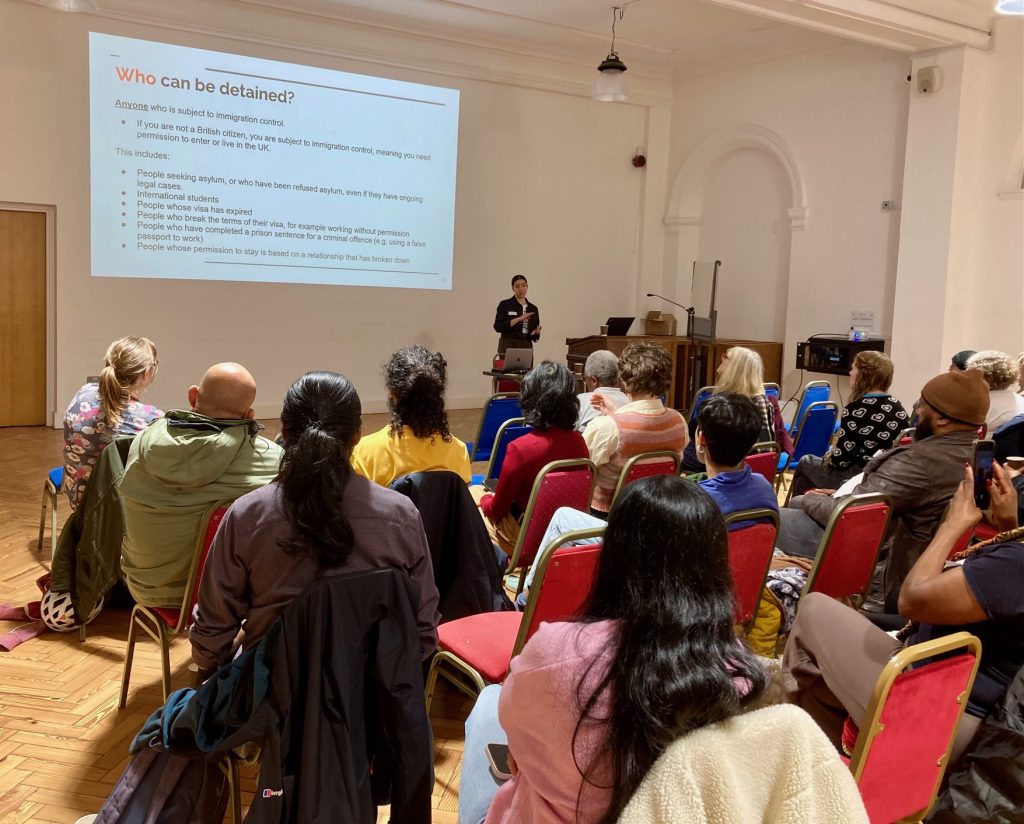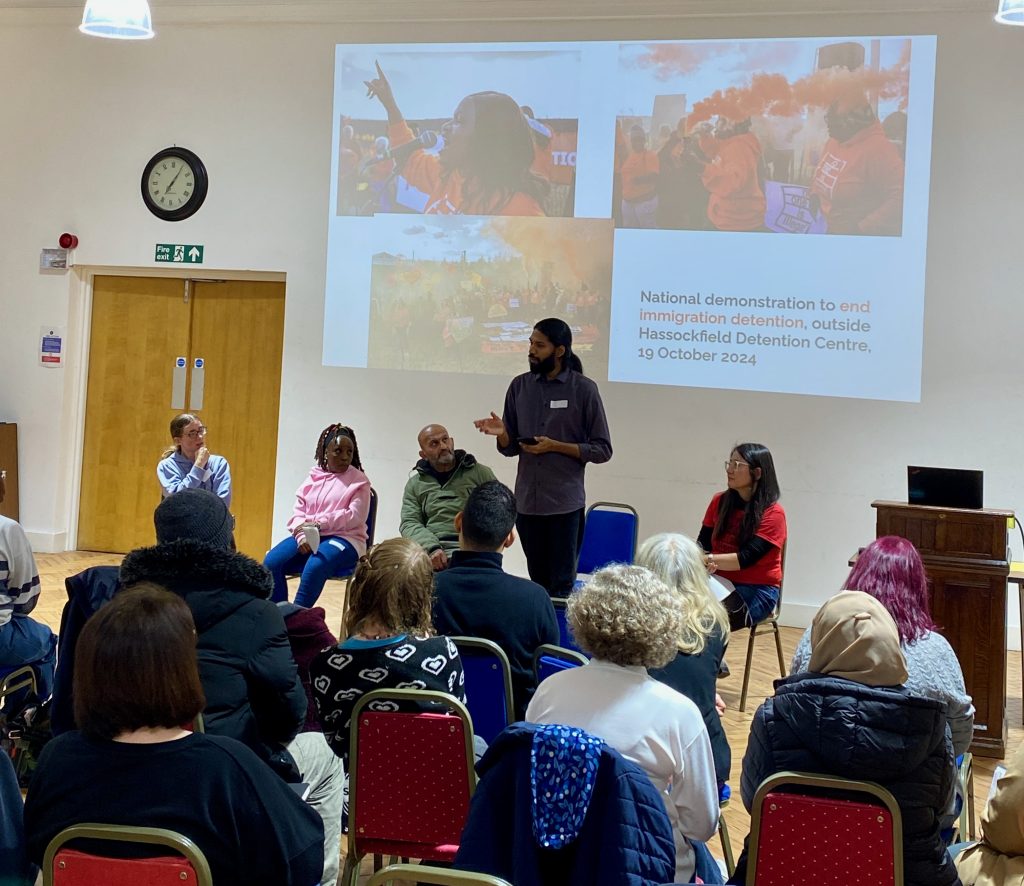We hosted our first ‘Thinking with our communities: detention and beyond detention’ workshop in Birmingham, on 6 November.
Before the General Election, we wrote an open letter to our communities. We said, ‘And during this election campaigning period, unfettered racism and anti-migrant narratives have also been unleashed, predictably. Their impact will linger on long after the election.’ Unfortunately our prediction came true with the far right riots in summer. We also said, ‘The change of government is not a system change. There might be some tweaks and it will have different politicians’ faces on it, but this inherently exclusionary and racist immigration system will continue to exist.’ The new Government’s approach to migration is the continuation of the same Hostile Environment.
Our world has been hostile and disaster-prone – and it looks like this state of the affair is likely to persist. When life gets very difficult, people often want to bury their heads in the sand. But at one point, we need to stop averting our gaze from what we fear. That’s how we feel about the topic of immigration enforcement. And the time is now.
Right to Remain is a micro organisation, and we think very carefully about where we put our energy in, because we can’t do everything. Looking ahead, however, it was no brainer for us in deciding what we must focus on – we must focus on protecting our communities from the harm and violence of immigration enforcement.
This is where Right to Remain is going to step up. We will be doing this in all three areas of our work: building knowledge through public legal education, building radical solidarity through strategic convening and building power through campaigning and organising.
Aside from the need to respond to the terror of the new Government’s policy to ramp up raids, detention and deportations, there are several other reasons for our decision.
The Rwanda panic surprised all of us. What surprised Right to Remain most was how unprepared people were, lacking basic knowledge about reporting and detention. This was the case even among professionals who have been working with asylum seekers, refugees and migrants for a long time. And this destabilised our already over-stretched and exhausted communities, creating chaos.
The Government also pledged to clear the infamous asylum backlog. If they are true to their words, it means many decisions on people’s asylum claims will be made quickly. The fact is that many people have not even had quality legal advice, let alone quality legal representation. There will be many successful cases, as well as refused cases. There will be many appeals, but without thorough legal representation. Then what?
Of course some of us are far ahead in this fight. Right to Remain’s campaigning wing, These Walls Must Fall, has been at the forefront of challenging immigration enforcement for years – because immigration enforcement didn’t start with the Rwanda plan, it has always been an integral part of the asylum and immigration system. These Walls Must Fall are already stepping up: they have just co-organised, with the No To Hassockfield campaign, a huge national demonstration to end immigration detention outside the Derwentside/Hassockfield immigration detention centre on 19 October.
It’s with this in mind we started our thinking with our communities workshops in Birmingham.
The main objective of the Birmingham workshop was equipping ourselves in case we or someone we know are detained and knowing what to do. The workshop had a good mix of participants: there were people who are going through the asylum and immigration system themselves and their allies, including people for whom this is the very first time they learn about immigration detention. We were also excited to welcome people who are not formally affiliated with any existing groups. We all need to be mainstreaming migration justice and building a bigger tent of radical solidarity, and new people often bring new connections and new energy into the migration justice movement.
On the day, first we ran our interactive pilot workshop on immigration detention. Led by Yumna, our Senior Legal Education Officer, over the course of an hour we went through the basics of detention – what it means, who it affects, what it’s like, how to support someone before and during detention, and how to get out of detention.
The second part of the workshop was dedicated to a community discussion, to think about detention, deportation and campaigning. We were lucky to have four panel speakers, all local to the West Midlands, who kick started the conversation. You can see the list of the panel speakers here.
There is no IRC – immigration removal centre – in Birmingham. You might wonder why we decided to do this event there where there is no detention centre.
It is easy to assume that detention doesn’t affect people outside the gates of the detention centres. If you speak to anyone who is reporting, you realise that that’s a fantasy. People are afraid of being detained – and that is why people are scared of going to report. And there is a reporting centre in Solihull, which is not far from Birmingham city centre, where people subject to immigration control from many surrounding areas must regularly travel to. Let us also not forget people who have been released from detention, only to be discarded back in their communities, harmed and distressed. As one of the experts-by-experience put it, ‘You can leave detention, but detention never leaves you.’ How can we be sensitive to their trauma and support them back to recover their sense of human dignity?
In other words, while there is a strong tendency for people to zoom in on what happens in detention centres (in our view the detention system as a whole encompasses so much more than the detention centres), detention and its psychological violence on our communities is in fact everywhere. Reporting – detention – deportation pipeline leaves no one, who is caught up in the labyrinth asylum and immigration system, feeling safe. Our intention is to broaden people’s focus beyond the physical sites of detention, and create meaningful solidarity where the pervasive impact of immigration enforcement is felt every day by our communities regardless of whether you are detained or not.
The first speaker at the panel discussion was Steph who works at BIRCH Network and Stories of Hope and Home. Those who report at the Solihull reporting centre were lucky to have people like Steph. When the Rwanda detention plan was announced in late April, she and her colleagues set up and organised a response team straight away. Their WhatsApp group attracted hundreds of people almost overnight, everyone wanting to do something to help our communities.
Steph talked about a tremendous surge of support she witnessed for their reporting solidarity group. She also said even she, who has been working in the sector for some time, was surprised by learning for the first time about people’s very raw experience of reporting. We know that there is a lot of stigma, fear and shame about reporting, and people do not always talk about it openly. Steph recounted an incident when she was suddenly thanked by a man who said he saw her outside the reporting centre, which demonstrates how a small act of solidarity from strangers can create a shared sense of power in our communities.
Virginia, who does not want to be defined by the phrase an ‘asylum seeker’’, spoke next. She is fighting for her right to remain in the UK (you can sign her petition here) explained passionately why she decided to start campaigning for herself, with solidarity of many others that she met through her time in the UK. Salman, who is an immigration advisor at Brushstrokes and an experienced trade unionist, has helped many individuals to campaign in the past. He stressed the importance of making connections with others from day one, to build a campaigning base. Finally Gee, who is the Co-Director at AVID, recounted the time his detention galvanised his friends to start campaigning to stop his deportation. He shed much light on what people in detention might experience, as well as how the process of people go through when they are detained.
We ended the session with a small group discussion where the participants discussed a fictional scenario, exploring possible community responses to reporting, detention and deportation. We discussed the need to centre the experiences of people seeking asylum and navigating the immigration system at all times, whether providing support or campaigning with them. We also talked about the critical importance of utilising all tools to campaign because each tool has merits as well as limitations. And most importantly, we re-iterated why campaigning for the right to remain needs to start as early as possible, and that any campaign will be based on human connections, relationships, trust and solidarity. Many participants stayed on after the session, talking to each other, shaking hands, hugging each other – having made and renewed connections and solidarity.
The feedback we received showed that everyone took something away from the session, with increased knowledge and increased desire to connect with others.
‘Almost everything was new info for me so it was really valuable learning – delivered clearly.’
‘I will encourage networking with community groups, encourage people to be part of a community and be brother / sister / keeper.’
‘Chance to meet others and be reminded we are not alone. Reflecting on how to prepare before and the importance of being willing / able to talk about difficult subjects, not hide.’
‘Immigration control is often run by consent and acceptance. Accepting you have to give up and accepting you are on your own. Experience and history tells a different story. Friends are better advocates than professionals, but you can only make friends if you get out and continue to do the things which define you outside of your immigration status, from joining a chess club to volunteering in a food bank. Share your story with people you grow to trust and in turn together we can change the narrative and the rules.’
At the same time, we are unsure to what extent we were successful in hammering in the message that we need to normalise radical solidarity outside the detention centres to address the fear of enforcement. While knowing about detention and preparing for detention is important, there are so many different ways, other than visiting people who are already detained (which is of course very important), that can build a more holistic resistance and response to immigration enforcement, without siloing different points of enforcement. These feedbacks are extremely valuable, as we continue to pilot these sessions in other areas. We are now heading to Nottingham to make new connections and see how different locations respond to our session.
Eiri Ohtani, Director


















Discussion: